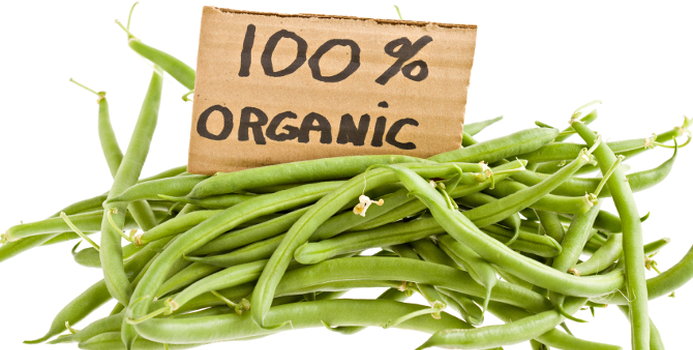Eating organic veggies significantly reduces your intake of pesticides and chemicals, but even though you are buying organic, you still need to wash your produce. Just because vegetables are grown organically does not mean that they are clean; they do grow in dirt. The organic label does not mean that your veggies are completely pesticide-free or contaminant-free either. The organic label only refers to the conditions in which the vegetables are grown. While organic veggies are not grown with pesticides, they can still become contaminated, which is why it's important to wash them first before eating.
The USDA Organic Label
When vegetables and other foods are labeled "USDA Organic," it means that the U.S. Department of Agriculture certifies that they are 95 to 100 percent free of synthetic chemicals, antibiotics and fertilizers. Additionally, the soil from which the veggies are grown has to have been chemical free for at least three years. Vegetables that carry the USDA Organic label are also required to be separated from non-organic veggies and other foods without the organic certification.
Pesticide Residue
Even veggies that are grown 100 percent organic can still contain pesticide residue. Washing them before consuming them can get rid of most pesticide residues. One way that pesticides can infiltrate organic farming practices is through close proximity to conventional farms. When conventional farms spray their crops it can drift toward the organic farm crops. There are also other environmental factors which cannot be controlled, like past pesticide use in the soil.
Contamination
Despite being organic, some vegetables are especially prone to contamination, like those without a tough outer skin. The organic label cannot control what happens to the vegetables after they leave the farm. Consider all of the people who touch them before you buy them. This includes store employees and customers. Washing your organic veggies can remove bacteria from the outside of them.
Washing Your Veggies
Different organic vegetables require different methods of washing. Very dirty organic veggies such as spinach and kale should be soaked in cool water for approximately five minutes and then rinsed off. More delicate produce, like tomatoes, can be sprayed with a spray bottle to prevent damaging the skin. Sometimes dirt and contaminants are difficult to remove; in this case you can add vinegar to the water, which removes more dirt and pesticides than just water.
You might be thinking that paying extra for organic vegetables isn't worth the money if you still have to wash away pesticides before consuming them. It is still important to choose organic veggies if possible. They still contain only a fraction (researchers estimate 1/3) of the pesticides that are found in conventionally farmed veggies.



